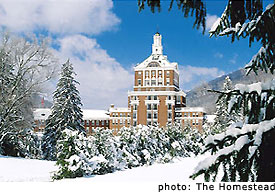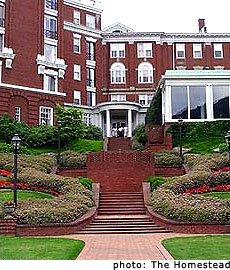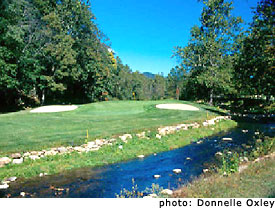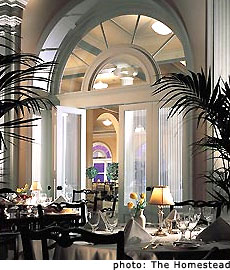Homestead for the Holidays
Golf, spa and turkey dinner at the historic Homestead Resort In Hot Springs, Virginia
by Dale Leatherman Harness bells jingled merrily as a pair of sturdy black horses drew our carriage deeper into the Allegheny foothills above the Homestead Resort, enveloping us in the aroma of spruce and pine. After a long climb, we stopped on a rise overlooking the hotel. Steam rose from the horses' warm backs as they rested, snorting in the crisp air.
Harness bells jingled merrily as a pair of sturdy black horses drew our carriage deeper into the Allegheny foothills above the Homestead Resort, enveloping us in the aroma of spruce and pine. After a long climb, we stopped on a rise overlooking the hotel. Steam rose from the horses' warm backs as they rested, snorting in the crisp air.
Below us, the great brick edifice looked like a Currier and Ives print, and I felt as if we had been transported back to the 1920s. Homestead for the Thanksgiving holiday was looking more and more like a great idea. The Old Course was open for play, after which we could go ice skating at the ski area. Or choose from dozens of treatments at the world-class spa. Or swim some lazy laps in the balmy indoor pool, where the water flows from warm springs deep underground.
The springs attracted the first visitors to what is now the village of Hot Springs, Virginia. Native Americans and early settlers felt the waters had healing properties, and by 1766 an inn was built on the site of the present resort. The Homestead served as a Confederate hospital during the Civil War, then flourished as a luxury resort throughout the late 1800s. In 1901 the ancient wooden structure was destroyed by fire, but the very next year a new all-brick hotel rose from the ashes. By 1929 the hotel looked much as it does today, with West and East wings flanking the classic clock tower. More than 500 luxurious guest rooms and suites lie within.
A few changes are obvious from the outside—an attractive outdoor pool complex and a large conference center, both of which blend seamlessly into the original architecture and landscaping. The old Casino was transformed into a golf clubhouse with a casual restaurant and the Golf Advantage School.  What cannot be seen from the outside is that the resort interior was painstakingly restored from top to bottom, a process that began when the fading resort was acquired by Club Corp in 1993 and continued for many years. As it had done with North Carolina's famous Pinehurst Resort, the company returned the Homestead to world-class status and has kept it in tiptop shape ever since. It is consistently ranked among the top resorts in the country for family, spa and golf vacations.
What cannot be seen from the outside is that the resort interior was painstakingly restored from top to bottom, a process that began when the fading resort was acquired by Club Corp in 1993 and continued for many years. As it had done with North Carolina's famous Pinehurst Resort, the company returned the Homestead to world-class status and has kept it in tiptop shape ever since. It is consistently ranked among the top resorts in the country for family, spa and golf vacations.
Three fine golf venues wind through the 15,000 acres of Virginia forestland that encompass the resort. The showpiece is the Cascades Course, a 1923 William Flynn design ranked in the top 100 courses in the U.S. and the world by Golf Magazine. The late Sam Snead, who began his professional career here in 1934 and was a member of the Homestead staff from 1975 to 1992, called it "the finest course in the South." In his 80s, Snead often matched strokes here with former vice president Dan Quayle. I once followed the pair around the course; tired but unbowed, Sammy scored in the 70s (as did Quayle). The Cascades was also a favorite of 1995 Ryder Cup captain Lanny Wadkins.
This winter the Cascades is undergoing an extreme makeover that will restore Flynn's original design features, some of which were altered by a Robert Trent Jones Sr. redesign in 1961. Wayne Morrison and Tom Paul are orchestrating the redesign which, according to director of golf Don Ryder, will concentrate on the bunkering in particular, which has deteriorated over the years. "The restoration will elevate the level of play and make the course more difficult," he says.
Hmmm, the par 70, 6,679-yard mountain layout is pretty tough enough already, with a rating of 73.0 and slope of 137. It will be ready for play in May 2006. It's one of my favorites, and I'll be anxious to see the effects of the facelift. The course has a dozen small waterfalls en route to three of the prettiest finishing holes to be found. Hole 16, ranked second in difficulty, has a pond in front, a creek to the right and a dense forest behind the green. From the back tees, the 527-yard par 5 is cunningly trapped on the fairway and perfect clubbing is required on the third shot to avoid water and bunkers. Seventeen and eighteen hug the stream and pond, finishing off with a par 3, 207-yard shot from an elevated tee over the pond to an elevated green. Throughout the course, level lies are hard to come by, and the savvy strategy is to use the terrain to orchestrate favorable bounces—easier said than done.  Not far from the Cascades is the par-72, 6,240-yard (72.6/134) Lower Cascades, designed in 1963 by Robert Trent Jones Sr. This pleasant track follows a stream through a valley with mountain ranges on both sides. As one would expect of the old master, Jones' fairways are generous, with bunkers in all the right places. But it is his extreme contouring on the greens—along with the beautiful setting—that make it so much fun to play. From the eleventh tee you can see much of the course and the mountains beyond.
Not far from the Cascades is the par-72, 6,240-yard (72.6/134) Lower Cascades, designed in 1963 by Robert Trent Jones Sr. This pleasant track follows a stream through a valley with mountain ranges on both sides. As one would expect of the old master, Jones' fairways are generous, with bunkers in all the right places. But it is his extreme contouring on the greens—along with the beautiful setting—that make it so much fun to play. From the eleventh tee you can see much of the course and the mountains beyond.
We didn't have to wait till spring to play the Old Course, which stays open through the Christmas holidays. Positioned on the hills overlooking the hotel, this rolling layout was designed by Donald Ross in 1892 as part of a six-hole route, then expanded to 18 holes by 1913. The 6,211-yard, par 72 (69.7/120) course was upgraded in 1994 by Rees Jones. In the process, the eighteenth green was relocated to make room for practice facilities and the Golf Advantage School. Untouched was the first tee, which holds the honor of being the country's oldest tee (1892) in continuous use. Though the fairways are generally wide, they are heavily sculpted to present challenging lies. Elevation changes also present opportunities for errors in judgment, and the small- to medium-sized greens are amply protected.
We played early so we could be back in the hotel for afternoon tea, a tradition consisting of delicate sandwiches, fresh baked scones and steaming cups of European tea served in the Great Hall. More than 200 feet long, the 42-foot-wide room is lined with 16 white Corinthian columns bordering a swath of carpet with a century-old design. During warm weather, screen doors open from the Great Hall onto the hotel's front porch, which has been lined with rocking chairs since the days when Henry Ford, Thomas Edison and John D. Rockefeller, Sr. frequented the resort. More than a dozen American Presidents have stayed here, too. Now it's decorated for the holidays, with an enormous Christmas tree at one end and garlands entwining the columns. Fires crackle in fireplaces along the sides, each fronted by a cozy grouping of chairs.
I always find a comforting familiarity at The Homestead. Aside from seasonal changes, the grande dame is always her same, elegant self. Faces are familiar, too. Many members of the Homestead staff have spent most of their adult lives dressed in the resort's green livery. They are wonderful hosts, and proud of their work. One of the most visible is maître'd Woody Pettus, a Homestead fixture for nearly 50 years. He stands at the entrance to the chandeliered main dining room, greeting guests by name, many of whom he has served fro generations.  Dining is a memorable experience anyplace at the resort, from continental cuisine in the main dining room to French and American fare in the intimate 1766 Grille, to steaks in the cozy Sam Snead Tavern and lunch in the casual Casino Club Restaurant.
Dining is a memorable experience anyplace at the resort, from continental cuisine in the main dining room to French and American fare in the intimate 1766 Grille, to steaks in the cozy Sam Snead Tavern and lunch in the casual Casino Club Restaurant.
Aprés golf activities include tennis, sporting clays, falconry, fly fishing, horseback riding, hiking and biking on hundreds of miles of trails. And, of course, carriage rides, a pleasure any time of year. Santa always arrives at the resort by carriage, too, which somehow seems right, even though the big Percherons could never be mistaken for reindeer.
Traditions such as this are part of the inimitable fabric of the Homestead, a family resort where the oft-forgotten values of courtesy and hospitality are very much alive.
By next spring The Homestead will have a new neighbor in the county. More than 100 of 450 home sites on the new Homestead Preserve (not affiliated with the resort) have been sold and several houses are under construction. The Preserve is situated on 2,300 acres adjoining the George Washington National Forest and the Warm Springs Mountain Preserve of The Nature Conservancy. All homes will be constructed in architectural styles native to the Allegheny Highlands.
For more information on The Homestead, visit http://www.thehomestead.com.

